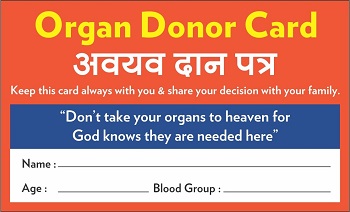FAQ for Organ Donation
What is the present status of organ transplantation ?
Advances in medical science now make it possible to replace a variety of malfunctioning human organs. For instance, since 1954, thousand of kidney transplants have taken place. Techniques for transplanting kidneys, liver, heart, lung, pancreas, intestine, bone and others tissues are currently well advanced.
How are organs for transplantation obtained ?
Kidney and part of liver can be obtained from healthy living individuals who are willing to donate on altruistic g r o u n d s . All organs and tissues can be obtained from a dead individual if his/her family consents to donate after death. Here we will discuss mainly about organs obtained after death.
Is there a need for organ donors ?
Yes. Many patients with end stage organ disease die while waiting for a donated organ. A donated organ, successfully transplanted, is literally the gift of life-your gift of life.
How can I become a donor after death ?
Simply sign an organ donor card in the presence of next of kin who will also sign. Then carry the card with you at all times. You will note that the card offers options:
a) Donate any needed part of body
b) Donate the organs you specify
Is there an age requirement for donors ?
Yes. Anyone 18 years of age or above and of sound mind may become a donor by signing the card. An individual under 18 years of age may become a donor if their parent or a legal guardian gives consent.
Can I change my mind later ?
Yes. Simply tear up the card. Nothing else is necessary
When will my gift be used ?
Your gift will be used after death has occurred. According t o the transplantation of Human Organ Act, 1994 a person is pronounced dead after heart stops beating or after brain death. If heart stops beating, all parts of the body cease to get blood supply and they too die. These organs cannot be used. Therefore, when a person dies at home, his/her organs cannot be used. When a person is brain dead and on life support in the intensive care unit the heart can continue to beat for a few hours or few days. During this period all the organs and tissues can be retrieved and used.
Do I have to mention the organ donation in my will ?
No. Your donor card is a kind of “pocket will†and is all you need. But obviously it’s important to carry the card and also inform your family and physician to ensure their co-operation.
Does the donor have to die in a hospital ?
Yes, since by definition a brain dead individual is on ‘life’ support in an intensive care unit. The eyes, however, can be removed for up to six hours after the heart stops breathing and hence this could even be done if the individual dies at home.
Will the decision cost anything to the donor’s family ?
No. The cost required for maintaining the donor will be borne by the recipient’s family or by the hospital from the time the consent for organ donation is given.
Do I have to register with some agency ?
No. Your signed and witnessed donor cards is all that is needed.
Is it possible that the brain dead patient survives after being declared dead?
No. The tests done by 4 experts twice at 6 hour interval leave no possible doubts about the diagnosis of brain death and hence there is no question of survival of the individual.
Will the relatives of the donor know to whom the organ are given ?
No. The name and address of the recipient is not given to the donor’s family and vice versa.
Will organ donation affect funeral and burial arrangements?
No. Removal of organs or tissues authorized by a donor will not interfere with customary funeral or burial arrangements. These remain the responsibility of relatives.
What medical conditions exclude a person from donating organ ?
Those with cancer (except localized cancer of the brain) and severe systemic infection are excluded from donating organs. Otherwise, all can donate if their healthy.
Will my family be paid or have to pay for organ donation ?
No.
What are the ethics of organ donation and transplantations?
Religious leaders the world over favor such donations as expressions of the highest humanitarian ideals. The gift of an organ essential to the life of another human being is consistent with principles of religious and ethical systems overwhelmingly held.
What else can I do to advance this life preserving program?
Acquaint others with the donor card program. As more organs become available, more lives will be saved.
